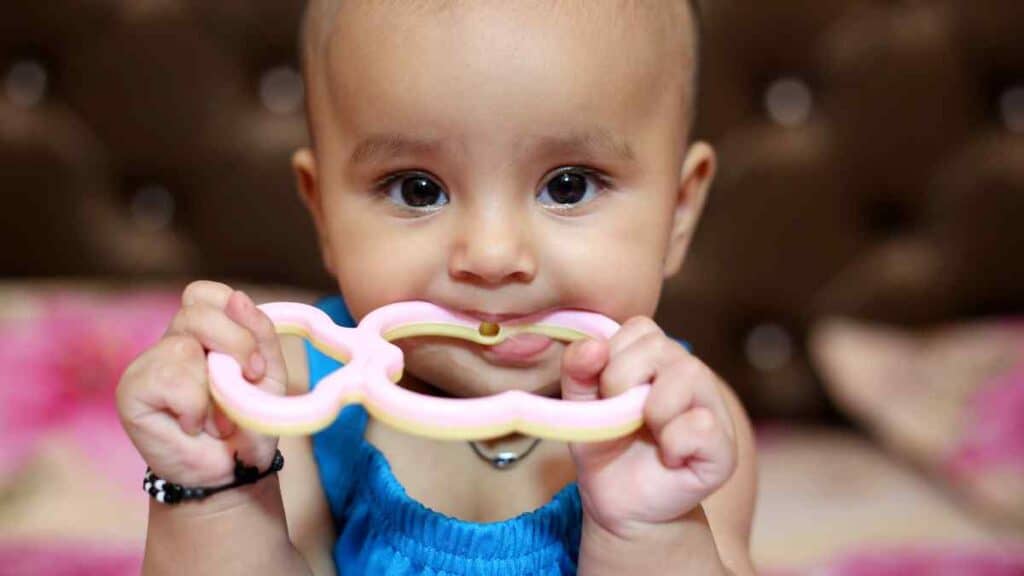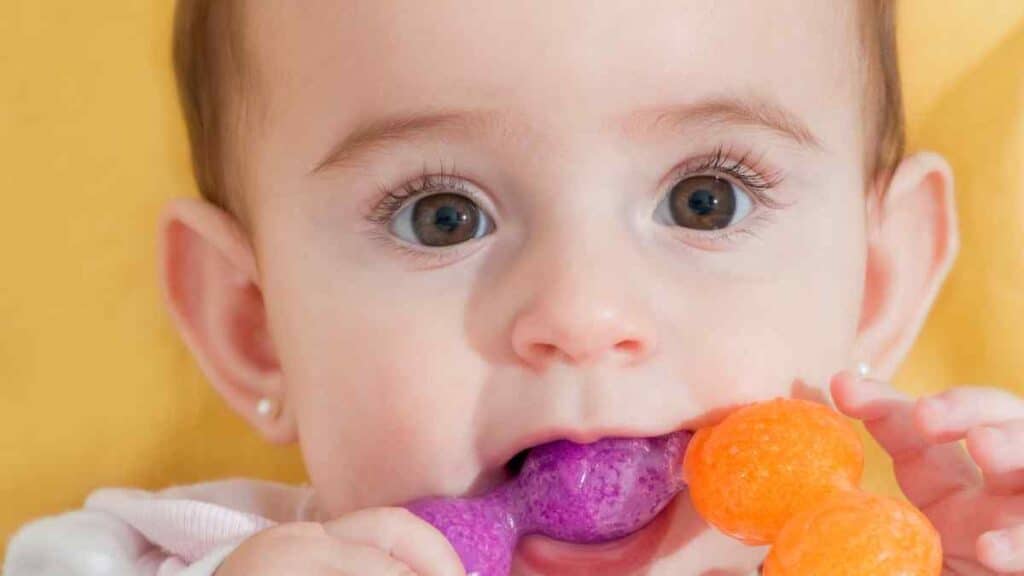Teething is a natural yet challenging milestone in a baby’s life, often accompanied by discomfort, pain, and irritability. As parents, it’s essential to find effective and safe methods to help alleviate your little one’s distress during this period. In this article, we will explore the role of baby water in providing relief to your teething baby.
We will discuss various techniques that utilize baby water to ease discomfort, while also considering important factors such as water temperature, safety precautions, and additional soothing remedies. By the end of this article, you will be equipped with valuable knowledge and practical tips to help your teething baby feel more comfortable and at ease.

When Do Babies Start Teething?
As new parents, it’s crucial to be prepared for the various developmental milestones your baby will encounter, including teething. Let’s explore the signs and symptoms of a teething baby and discuss various remedies to help alleviate their discomfort, especially on their tender gums.
Typically, babies start teething between 4 and 7 months of age, although some may begin earlier or later. This process can cause soreness in your child’s gums and teething pain, leading to a fussy and irritable baby. To recognize the signs of teething, keep an eye out for increased drooling, a tendency to bite or chew on objects, and red or swollen gums.
There are numerous baby teething remedies available to help soothe your baby’s gums and provide pain relief. Teething toys, such as silicone or rubber teethers, can offer relief by applying gentle pressure to the baby’s mouth. However, avoid amber teething necklaces as they pose a choking hazard and their effectiveness remains unproven.
Natural teething remedies, such as cold or chilled items, can help numb your baby’s sore gums. Offering a cold spoon, a chilled teething ring, or even a cold washcloth for your baby to gnaw on can provide relief. As your baby starts to consume solid foods, cold or frozen fruit in a mesh feeder can also be a soothing option.
Homeopathic teething remedies, like teething gels or tablets, should be approached with caution as some may contain ingredients that are unsafe for babies. Consult your pediatrician before using any over-the-counter teething products.
To maintain your baby’s oral hygiene during teething, use a soft-bristled baby toothbrush to gently clean their teeth and gums. Wiping your baby’s chin with a clean cloth can help prevent rashes from excess drooling.
It’s essential to understand that teething can be a challenging time for both you and your baby. Patience, reassurance, and gentle rocking may help your baby fall asleep and find comfort during this trying period.

Signs Your Baby is Teething
Now that you know when to expect teething to begin, it’s essential to recognize the signs that your baby is teething. In this column, titled “Signs Your Baby is Teething,” we will discuss the most common teething symptoms and how to identify them, ensuring that you can provide your little one with the necessary care and support during this trying time.
Swollen or tender gums
One of the primary indicators that your baby is teething is swollen tender or red gums. Gently examining your baby’s mouth will help you determine if their gums are inflamed, signaling the onset of the teething process.
Increased drooling
Teething babies tend to produce more saliva, which can lead to excessive drooling. This increase in drool may also cause your baby’s chin to become chapped or red, so it’s essential to keep it clean and dry.
Chewing or biting
Teething pain often prompts babies to chew or bite on anything they can find, from their fingers to teething toys, as applying pressure to their gums can provide some relief. Ensure that any objects your baby chews on are safe and free from choking hazards.
Fussiness or irritability
The discomfort of teething can make your baby more irritable or fussy than usual, particularly in the late afternoon and evening. Providing comfort and soothing measures, such as rocking or holding your baby, can help them feel more at ease.
Difficulty sleeping
Teething pain can make it challenging for your baby to fall asleep or stay asleep, leading to restlessness and frequent waking. Offering a cold teething ring or gently massaging your baby’s gums with a clean finger may help soothe them before bedtime.
Refusal to eat
The pain and discomfort of teething can cause some babies to refuse solid food or even breast milk. Maintaining patience and offering soft, cold foods or cold breast milk in a bottle can encourage your baby to eat despite their discomfort.
Ear pulling or cheek rubbing
Teething babies may pull at their ears or rub their cheeks as a way to soothe the pain radiating from their gums. However, be aware that these symptoms can also be signs of an ear infection, so consult your pediatrician if you’re uncertain.

Caring for Your Baby’s New Teeth
Once your baby’s teeth begin to emerge, it’s essential to ensure proper oral hygiene and care for their new teeth. In this column, titled “Caring for Your Baby’s New Teeth,” we will delve into the best practices for maintaining your baby’s oral health and fostering a strong foundation for their future dental well-being.
Begin dental hygiene early
Initiate good dental hygiene habits as soon as your baby’s first tooth appears. Gently clean their teeth and gums using a soft, cold washcloth or a soft-bristled baby toothbrush with a small head, designed specifically for infants. It’s important to clean their teeth at least twice a day, especially after feedings and before bedtime.
Introduce toothpaste gradually
As your baby grows older, typically around 18 months, you can introduce a small, rice-grain-sized amount of fluoride toothpaste. Ensure that the toothpaste is safe for infants and approved by the American Dental Association (ADA).
Manage teething pain
Continue to employ various methods to alleviate your baby’s teething pain, such as offering cold teething rings, chilled washcloths, or even a cold metal spoon for them to gnaw on. Ensure that the items provided are safe and free from choking hazards. Consult your pediatrician before using any teething gels or over-the-counter pain relief medications, and always adhere to the correct dosage.
Monitor excessive drooling
Teething often leads to excessive drooling, which can cause irritation and rashes on your baby’s skin. Keep their chin and mouth area clean and dry using a soft, clean washcloth, and change their clothes if they become too damp.
Encourage healthy eating habits
As your baby begins eating solid foods, introduce them to a balanced and nutritious diet that promotes healthy teeth. Avoid excessive sugar and provide a variety of fruits, vegetables, and whole grains.
Schedule dental visits
Many parents may not realize the importance of early dental visits. Schedule your baby’s first dental appointment once their first tooth erupts or by their first birthday. Regular dental check-ups can help identify any potential issues early on and set the stage for lifelong dental health.

10 Tips on How to Soothe a Teething Baby
After learning how to recognize the signs that your baby is teething and exploring various ways to care for their new teeth, it’s essential to know how to soothe their discomfort during this challenging phase. In this column, titled “10 Tips on How to Soothe a Teething Baby,” we will provide practical advice and strategies to help your little one find relief from their teething pain.
Cold teething toys
Chilled or cold teething toys can offer comfort by numbing your baby’s gums. Make sure these toys are free of choking hazards and are made from safe materials.
Wet washcloth
Place a clean, wet washcloth in the refrigerator for a short while, then offer it to your baby to chew on. The cold and texture will help alleviate their discomfort.
Gentle gum massage
Use a clean finger to gently massage your baby’s tender gums, applying light pressure to provide relief from teething pain.
Cold food or drinks
If your baby is already eating solid foods, offering cold or chilled items like applesauce or yogurt can soothe their sore gums. Alternatively, provide cold breast milk or formula in a bottle.
Avoid amber teething necklaces
These necklaces pose a choking hazard and their effectiveness remains unproven. It’s best to stick to safe and recommended teething remedies.
Distraction
Engaging your baby with play, cuddles, or soothing music can help take their mind off the pain and provide comfort.
Over-the-counter pain relief
Consult your pediatrician before using any over-the-counter pain relief medications, such as acetaminophen or ibuprofen, and ensure that you administer the correct dosage.
Keep their face clean
Excessive drooling during teething can cause chapping or rashes on your baby’s skin. Gently clean your baby’s face with a soft cloth to keep their skin healthy and comfortable.
Maintain oral hygiene
Use a soft-bristled baby toothbrush to gently clean your baby’s new teeth and gums, keeping their mouth clean and healthy during the teething process.
Seek professional advice
If your baby’s teething symptoms become severe or you have concerns about their well-being, consult your pediatrician for guidance and support.

When to Call Your Baby’s Healthcare Provider
After exploring various tips on how to soothe a teething baby, it’s important to recognize when it’s time to seek professional help. In this column, titled “When to Call Your Baby’s Healthcare Provider,” we will discuss the signs and symptoms that warrant contacting your baby’s healthcare provider during the teething process, ensuring that your little one receives the appropriate care and support they need.
While many parents can successfully manage their child’s teething discomfort with remedies such as cold washcloths, chilled mashed bananas, or teething toys, there are times when professional guidance becomes necessary. The following signs and symptoms may indicate that it’s time to call your baby’s healthcare provider:
- Persistent or worsening pain: If your baby’s teething pain does not subside or worsen despite your best efforts to soothe them, consult your baby’s healthcare provider for further evaluation and guidance.
- High fever: A low-grade fever is sometimes associated with teething, but a high fever (above 100.4°F or 38°C) is not. If your baby develops a high fever, it could be a sign of an infection, and you should contact your healthcare provider.
- Prolonged irritability or inconsolability: It’s normal for teething babies to be fussy or irritable, but if your baby remains inconsolable for an extended period despite your attempts to comfort them, it may be a sign of a more serious issue that requires medical attention.
- Swelling or redness around the tooth: Some redness and swelling of the baby’s gums are expected as a tooth erupts. However, if the swelling or redness becomes severe or persists for more than a few days, consult your baby’s healthcare provider.
- Diarrhea or vomiting: While some parents associate diarrhea or vomiting with teething, these symptoms are not typically related. If your baby experiences diarrhea or vomiting, it could indicate an illness or infection that requires medical attention.
- Difficulty breathing or swallowing: If your baby appears to have difficulty breathing or swallowing, this could be a sign of a more serious issue, and you should contact your healthcare provider immediately.

Conclusion
In conclusion, understanding the connection between baby water and teething is vital for parents seeking ways to alleviate their baby’s discomfort during this challenging period. By exploring various strategies, from cold teething toys to safe and soothing baby water options, parents can provide their little ones with the relief they need.
Additionally, recognizing when to seek professional help from a healthcare provider is essential in ensuring your baby’s well-being during the teething process. By staying informed, patient, and attentive to your baby’s needs, you can help them navigate this difficult phase with ease and comfort, creating a nurturing environment for their continued growth and development.
Did this article help you? We’d love to hear from you! Do you have a question about how to use this information in your own life? Let us know in the comments.



